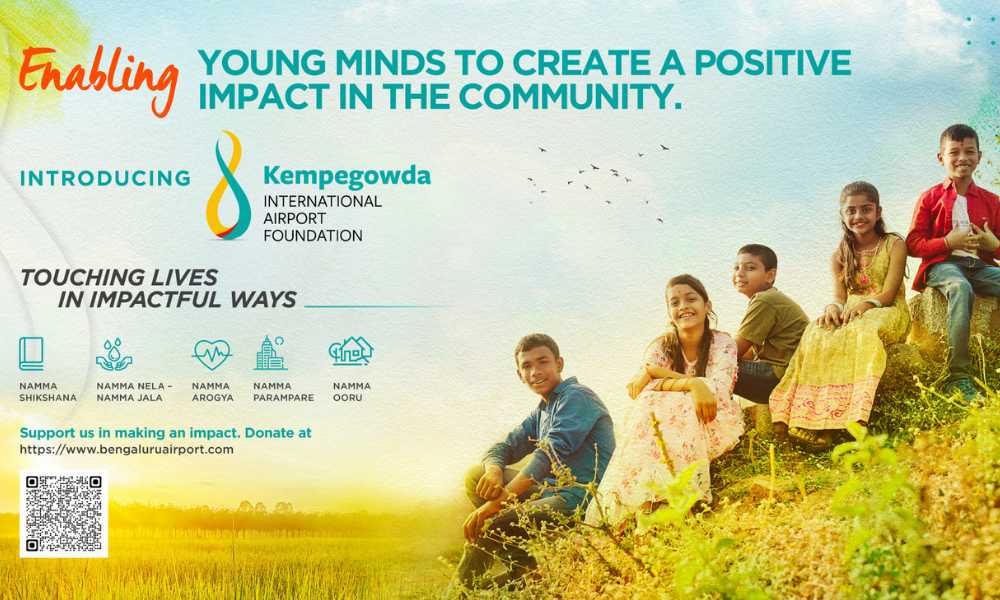
Image Credits: KIAF
KIAF: An Initiative To Enable Holistic Development Through Targeted Community-Level Interventions
India, 10 May 2022 7:38 AM GMT
Kempegowda International Airport Foundation (KIAF) aims to create social value for communities around the Airport by focusing on the five primary pillars of development aligned with the United Nations Sustainable Development Goals (UN SDGs).
India is a young developing nation with immense potential whose overall growth heavily depends on the empowerment of its youth, building capacities, skill development, and employability. Right investments and on-ground support can play a critical role in the country's transformational journey. The grassroots collectives can massively be empowered and contribute to a more significant economic development.
To enable holistic development through targeted community-level interventions, Bangalore International Airport Limited (BIAL) in March 2020 set up its CSR wing, Kempegowda International Airport Foundation (KIAF). The foundation aims to create social value for communities around the Airport, in particular, and the social ecosystem at large by focusing on the five primary pillars of development. These pillars are aligned with the United Nations Sustainable Development Goals (UN SDGs), comprising Namma Shikshana (Holistic Education), Namma Arogya (Promotion of Health), Namma Ooru (Integrated Development), Namma Nela-Namma Jala (Water & Sanitation) and Namma Parampare (Conservation of Culture & Heritage).
Namma Shikshana
Tying back to the UN SDG for quality education, the Namma Shikshana initiative aims to augment the learning ecosystem, create opportunities and provide access to quality education for children enrolled in Government Schools. Under this initiative, KIAF manages five Government Schools adopted by BIAL in Devanahalli Taluk of Bengaluru Rural District for 10 Years through an MoU with the Karnataka Government. KIAF has also undertaken various infrastructure and programmatic interventions. These interventions include providing everyday breakfast and learning kits, overhauling infrastructure, supporting scholastic activities, and promoting students' overall health and well-being to ensure a complete learning experience for all students. So far, the initiative has enabled and created a positive impact on the lives of 3,000 children.
BIAL has rebuilt these adopted five Government Schools from the foundation level along with refurbishment of additional six schools with necessary facilities and upgraded the infrastructure of 21 Anganawadis. Additionally, special mentoring sessions have been set up for slow learners, and full-time subject resource persons have been engaged at these schools, which have translated into better learning outcomes, evidenced by students' examination results and academic achievements.
Namma Nela - Namma Jala
Improving quality of life begins with access to clean water, better sanitation, and hygienic living conditions. In line with UN SDG 6 for Clean Water and Sanitation, the Namma Nela – Namma Jala initiative by KIAF focuses on enabling access to clean water and sanitation through sustainable water management practices such as harnessing rainwater to enhance groundwater reserves. So far, over 315 household rainwater harvesting units have been built across 11 villages benefiting around 300 families.
In 2020, in association with KSRTC, BIAL jointly unveiled the innovative 'Sthree Toilet' by converting a bus no longer in service into a women's toilet powered by solar energy. This award-winning initiative focused on building clean and safe community toilets exclusively for women.
Namma Arogya
The impact of the COVID pandemic has been immense, and the social and economic disruptions caused have been devastating for tens of millions of people, especially those from more vulnerable sections of society. KIAF, during this period, established a 150-bed transit step-down oxygen delivery centre called COV-AID@BLR to benefit the community at large. The initiative aimed to assist the government in treating mild COVID patients effectively. KIAF donated more than 150 Oxygen Concentrators to Government Hospitals and COVID Care Centres across different regions in Karnataka and contributed to strengthening the healthcare infrastructure for community welfare.
Namma Parampare
Karnataka has always been acclaimed for its rich heritage and cultural diversity. KIAF Namma Paramapare initiative that adheres to the UN SD G for Sustainable Cities and Communities aims to preserve the natural, built, and intangible heritage and culture through the participation of stakeholders and communities.
In collaboration with various Government departments, KIAF proposes to develop a Heritage Corridor involving the development of Devanahalli Fort as a Heritage Site, conservation of India's first Biodiversity Heritage Site at Nallur in Devanahalli Taluk, and the development of a century-old Nandi Railway Halt Station. A joint committee involving all stakeholders would be formed to implement the project effectively. The highlights of this project would entail focusing on pathway development, landscaping, and promotion of cultural activities.
Namma Ooru
All development projects and initiatives have a parallel impact on the natural environment and flora and fauna associated with the ecosystem. KIAF's Namma Ooru initiative ties back to the UN SDG's commitment to reducing inequality and revitalising partnerships for sustainable development to conserve, protect, foster, and grow Devanahalli Pomelo Saplings; a GI tagged flora facing the threat of extinction.
Devanahalli Pomelo was grown extensively across all villages in Devanahalli Taluk. The land under cultivation of the flora was reduced to a few non-contagious villages post-acquisition for various Industrial and Non-Industrial establishments in the taluk, including KIA. To conserve and promote the cultivation of this flora, BIAL has procured 500 Devanahalli Pomelo saplings and planted them in identified plots within the airport campus for exclusive cultivation of the native Devanahalli pomelo plant.
BIAL has also ensured an equitable society with access to essential commodities. Their Namma Chethana initiative, launched on March 31, 2020, began with 3,000 meals a day and gradually scaled up to 12,500 daily meals for families across 3 districts affected due to the COVID pandemic, and grocery kits comprising essentials items and goods were distributed to 8,500 families during the first wave.
BIAL's efforts have been recognised by the Karnataka Government in their 2021 annual calendar, which featured two KIAF-adopted Government Higher Primary Schools. Their education programme Namma Shikshana was also awarded the Golden Peacock National CSR Award 2020 from the Institute of Directors. The Logical Indian applauds BIAL's efforts to enable holistic development through community-level interventions.
Visit BIAL's website to contribute to its efforts in creating social value and helping communities.
 All section
All section













